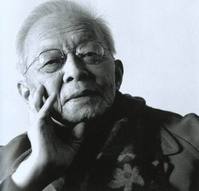Bian Zhilin
Bian Zhilin (Chinese:卞之琳) was born on December 8, 1910 in Haimen, Jiangsu Province. He entered Peking University in 1929 thanks to a relative's financial support and majored in English. The following year, he published his debut short story "Night's Creeping Up" in the supplement to North China Daily. His first collection of poems Leaves of Three Autumns, with more than 100 pieces included, was printed in 1933 shortly before his graduation. His second collection of poems, Fish Eyes, was published in 1935. An anthology of works by Li Guangtian, He Qifang, and Bian Zhilin appeared in 1936 under the title The Han Garden. A lover of the classics, Bian also subscribed to the viewpoint of the French symbolist poets. His writings, therefore, were peculiar in style, expressing his personal sentiments mingled with indignation at social evils. The collections Fragment (1935) and Dream of an Old Town (1936) are typical of his poems.
He taught at Sichuan University in the early stage of the War of Resistance against Japan before his visits to Yan'an and the Taihang Mountain area in 1938. he gave lectures at Lu Xun Arts Institute and also experienced army life, his style from that time on changed and he devoted himself to describing the people's lives and their struggle against Japanese aggression. His efforts resulted in the volume of reportage Verdurous Is the Wheatland in Southeast Shanxi and Letters of Gratitude (1940), a book of poetry. In 1940, he moved to Kunming, Yunnan Province, where he was invited to teach at Southwest Associated University. Later that year, he wrote another piece of reportage "A Regiment around the Taihang Mountains." Several poetry collections ensued. When the war against Japan ended in 1945, Bian became a professor at Nankai University in Tianjin. He was recommended in 1947 by the British Council to be a visiting research fellow at Oxford University.
In 1949, he returned to China and taught first at Peking University and then transferred to the Research Institute of Literature of Peking University. He was admitted to the Communist Party of China in 1956. Thenceforth, he devoted most of his time to the study and translation of foreign literary works. He was director of the Research Institute of Foreign Literature of the Chinese Academy of Social Sciences.
As a translator, Bian introduced a number of world masterpieces to Chinese readers, including the tragedies of William Shakespeare and works by the French writer Andre Gide, such as Le Retour de l' enfant prodigue and La Porte etroite. In addition, his treatises on the study of Shakespeare's plays are generally regarded as fine pieces of scholarship.
Bian died on December 2, 2000 in Beijing.
His main works include A. Gide's Le Retour de l' enfant prodigue (1937), A. Gide's Strait Is the Gate (1943), "Fragment" (1935), Dream of an Old Town (1936), W. Shakespeare's Hamlet (1956), "A Piece of Shipwreck" (1981), "A Crack Shot at the Front"(1981), "A Night at Cheba" (1982), and "Introduction to Four Tragedies by W. Shakespeare" (1985).
